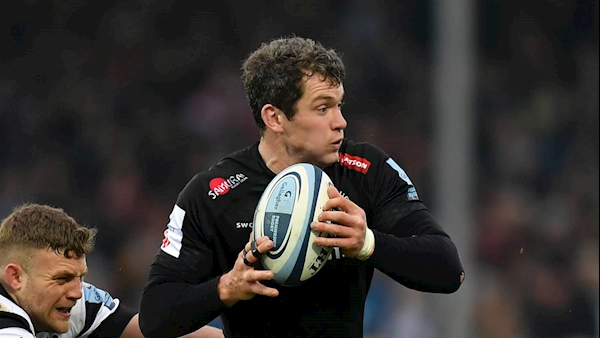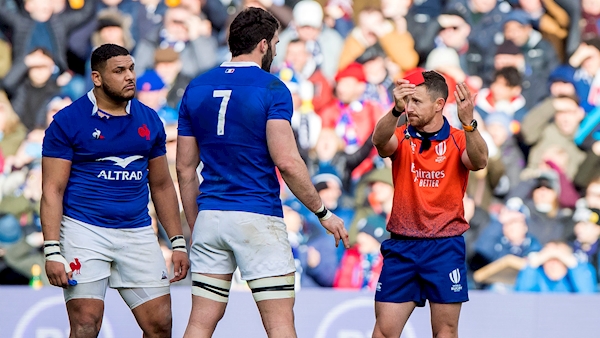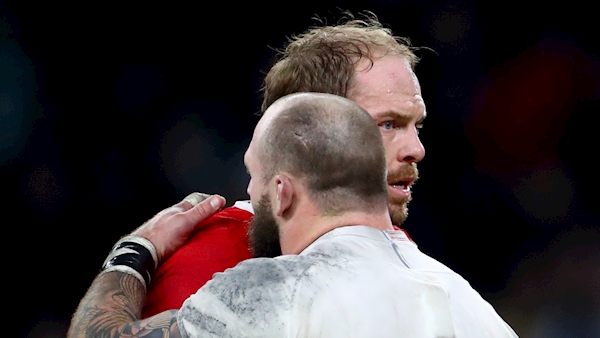By Peter Jackson
Joe Marler’s attempt to emulate Vinny Jones’ notorious ‘nut-cracker’ grab at a teenaged Paul Gascoigne (Wimbledon v Newcastle, February 1988) exposes the England prop to the risk of a 12-week ban at the very least.
Those found guilty of ball-tampering tend to end up sitting on their backsides for a lot longer.
Two years ago, Cricket Australia stripped Steve Smith of the national captaincy and banned him for 12 months for failing to stop two of his players using sandpaper to rough up one side of the ball during a Test match in Cape Town.
Marler’s roughing up of Alun-Wyn Jones at Twickenham may have eluded the referee, his two assistants, and the TMO but the cameras caught him red-handed, so to speak. The Welsh captain’s appeal to everybody in general and nobody in particular said it all: ‘Have you not seen what he’s done?’
They have now, and you would like to think World Rugby were on the case before Jones urged them to ‘have a look’. The punishment for those guilty of ‘testicle grabbing, twisting, or squeezing’ ranges from 12 to 24 weeks.
When it comes to dissing the Welsh at HQ, Marler has previous. Four years ago, the loose cannon loosehead called the opposition tighthead Samson Lee, a member of the Travelling community, ‘Gypsy Boy’.
Despite an apology from Marler, a handshake, and Lee’s refusal to turn the drama into a crisis, the Welsh Rugby Union made a formal complaint. Almost four weeks after the match, an independent tribunal banned the Harlequin for two matches and fined him £20,000.
As Bob Dylan would say, ‘when will they ever learn’?
Ireland’s forgotten man Whitten making a name at Exeter

While Ireland’s squad spent the weekend washing hands and kicking heels, one of their forgotten exiles took another step towards finishing the season with a big day out at Twickenham.
Ian Whitten, last chosen by Ireland so long ago that even his best friends might struggle to remember where and when, helped ensure Exeter’s return to the top of the English Premiership with a thumping home win over Bath.
At 32 going on 33, the Chiefs’ centre is on track for a fourth final in five seasons, some consolation for having sacrificed his Test ambitions by moving to Devon from his native Ulster eight years ago. His Ireland career started one week in May 2009 against Canada in Vancouver, and ended eight days later against the USA in Santa Clara. Despite a try in each game while the front-line players were otherwise engaged with the Lions in South Africa, Whitten lost his place and never got it back. Some of those around him, notably Gavin Duffy, Darren Cave, Ian Dowling, Ian Keatley, Bob Casey and John Muldoon, devoted their best years to the national cause without ever nailing down a place.
Haouas haymaker proves costly for France

The shattering impact of Mohamed Haouas’ right fist on the Six Nations title has saved Ireland and the rest from coughing up roughly €1,156,159 and 93 cents.
The money, divvied up at around €230,000 per country, had been agreed as the bonus for a Grand Slam which Fabien Galthie’s rejuvenated France dreamt of completing in Paris next Saturday night.
With England, Italy and Wales accounted for, they were on course to take care of Scotland until the prize vanished like a mirage shortly after 3.30 yesterday afternoon.
Maybe they would have lost anyway with a full complement but Haouas, a tough nut who had survived a troubled childhood to make a different name for himself in the scrum, removed any doubt.
The punch which struck James Ritchie in the face during an otherwise harmless bit of handbagging took some finding. Once it had been detected by the TMO, Ireland’s Brian McNeice, Haouas had left himself nowhere to go other than through the nearest exit from the stage.
The old Gallic hit-men from the lawless Seventies would have thrown their arms up in disgust, not least Gerard Cholley.
The ex-paratrooper and amateur heavyweight boxer, is said to have knocked out four Scottish forwards in separate incidents at Murrayfield in 1977 and was still slugging away at the end in an era when the Establishment considered it bad form for referees to send anyone off.
Haouas discovered the hard way that crime no longer pays. France, 7-6 ahead despite giving the impression that they would rather be anywhere else than Edinburgh on a Sunday afternoon, dissolved in his absence. Unworthy of the most miserable of bonus points, they cannot claim the title even if they finish with a flourish.
The wait seems likely to last for at least six months before a suitable date is found for England’s biennial fill-your-boots trip to Rome, Coronavirus- permitting. Denied a similar opportunity in Dublin, Ireland’s weekend of enforced isolation has seen them drop down to fourth, below the Scots.
Mathematically, they could still win the whole shebang although after Twickenham even Lazarus would think twice about such an implausible scenario.
Had the Italian match gone ahead and the visitors matched their average of conceding 35 points, Andy Farrell might well have been looking down this morning on the rest.
Instead of being a point clear in pursuit of the title, Ireland are in the bottom half.
That means their share of the prize money has gone down from around €5.6m to €2.3m, a drop, as it stands, of almost 60 per cent.
At least they are still in with a shout.
Williams struggles with blue hues
Kiwi referee Paul Williams’ opening decision at Murrayfield must have left players and viewers in a state of suspension.
‘Advantage blue,’ he called out in a match featuring teams in different shades of the same colour.
He meant the deeper blue of France, not the sky blue change strip as worn by the Scots.
A later instruction from Williams suggested he was still struggling with the colour.
“Nine white offside,” he said, referring to home scrum-half Ali Price, in sky blue.
International Women’s Day Special: Where is the media with women’s sport?
[marketing=iesportpodcast]
